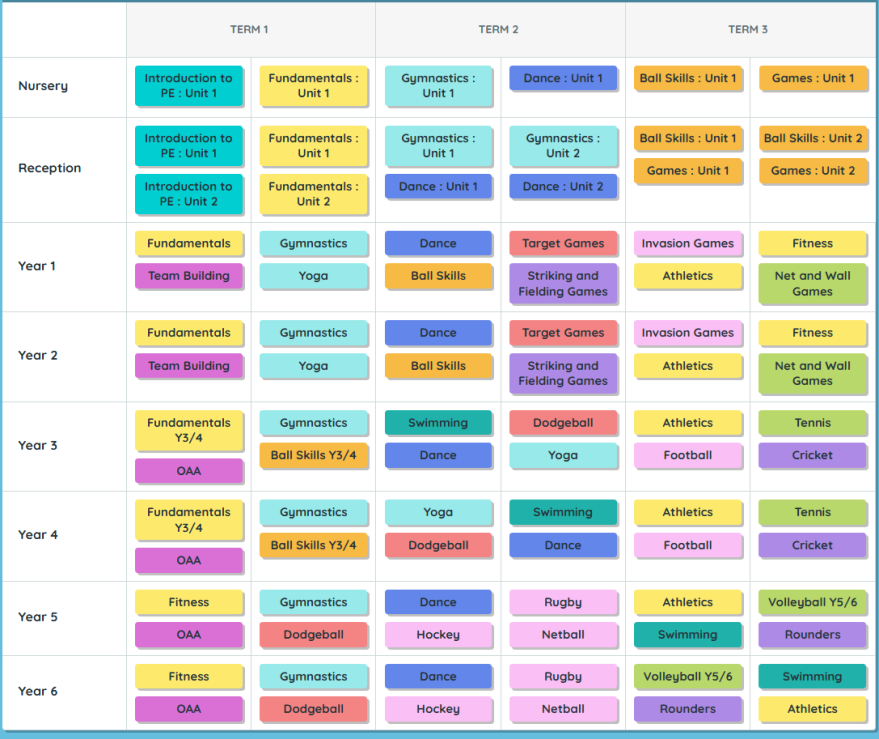P.E.
At St Martin's, Physical Education is a vital part of our curriculum, promoting physical health, mental wellbeing, and personal development.
We use the Get Set 4 PE scheme to deliver a high-quality, inclusive programme that inspires all pupils to enjoy being active and develop lifelong habits for healthy living. Our PE curriculum is carefully sequenced to build fundamental movement skills, confidence, and teamwork across a broad range of activities. Pupils take part in games, gymnastics, dance, athletics, fitness, swimming, and outdoor adventurous activities, with each unit designed to be engaging, progressive, and accessible to all.
Through Get Set 4 PE, pupils learn to:
-
Move with control, coordination, and purpose.
-
Work collaboratively and competitively with others.
-
Understand the importance of physical activity for body and mind.
-
Develop resilience, leadership, and respect through sport.
We celebrate participation and progress, encouraging every child to find joy in movement and pride in their achievements. By the end of Key Stage 2, pupils leave with the skills, knowledge, and confidence to lead active, healthy lives and continue their physical development in secondary school and beyond.
At St Martin's, PE is more than a subject—it’s a gateway to teamwork, resilience, and healthy, active living.
Big Ideas
Our curriculum is underpinned by key themes such as physical literacy, teamwork, resilience, and healthy lifestyles. These ‘big ideas’ help pupils understand the wider purpose of physical education beyond skill development. Concepts like fairness, respect, and perseverance are embedded throughout, enabling children to connect physical activity with broader life skills. We promote inclusive participation, enjoyment, and personal challenge, ensuring all pupils develop confidence and competence in a range of physical activities. These ideas are revisited across year groups to deepen understanding and encourage lifelong engagement with physical activity and sport.
Content
Our curriculum offers a broad and balanced range of physical education experiences, including dance, gymnastics, games, athletics, swimming, and outdoor adventurous activities. Each unit is designed to meet national curriculum requirements while supporting progressive skill development. Pupils learn fundamental movement skills, tactical awareness, and sport-specific techniques. We also include opportunities for leadership, collaboration, and self-assessment. The curriculum is enriched with inclusive activities that cater to varying abilities and interests, supporting both competitive and non-competitive contexts to promote physical, social, and emotional development.
Sequencing
Our curriculum is carefully sequenced to ensure progression in physical skills, knowledge, and understanding. Units build on prior learning, with clear links across year groups and key stages. Fundamental movement skills are introduced early and revisited in increasingly complex contexts. For example, throwing and catching may begin in KS1 and evolve into strategic gameplay in KS2. Seasonal sequencing supports practical delivery, with outdoor units placed in warmer terms. This structured progression ensures pupils develop competence and confidence over time, with opportunities to consolidate and extend learning through extracurricular sport and inter-school competition.
Oracy and Vocabulary
Our curriculum actively promotes oracy and vocabulary development through structured questioning, peer discussion, and reflection. Pupils learn key terminology related to movement, tactics, anatomy, and health, which is embedded in lesson plans and teacher guidance. Vocabulary is introduced explicitly and revisited regularly to support retention and understanding. Pupils are encouraged to articulate their thinking, describe techniques, and evaluate performance using subject-specific language. This focus on communication enhances cognitive engagement and supports cross-curricular links, particularly with English and science. Oracy is also developed through leadership roles, such as coaching peers or leading warm-ups.
Assessment of Pupils
Assessment in our curriculum is both formative and summative, embedded throughout each unit. Teachers use observation, questioning, and peer/self-assessment to gauge understanding and progress. Each lesson includes clear learning objectives and success criteria, allowing pupils to reflect on their achievements. Summative assessment is supported by end-of-unit outcomes and progression maps, helping teachers track development across year groups. Assessment is inclusive and focuses on effort, improvement, and engagement as well as skill mastery. This approach ensures all pupils are recognised for their progress and supports targeted intervention where needed.
Reasonable Adjustments for Pupils with SEND
Our curriculum provides guidance for adapting activities to meet the needs of pupils with SEND. Lessons are designed to be inclusive, with differentiated tasks, equipment, and groupings. Teachers are encouraged to modify rules, simplify instructions, and offer alternative roles to ensure full participation. We promote a strengths-based approach, recognising and celebrating individual achievements. Visual aids, peer support, and scaffolded challenges help pupils access learning meaningfully. These reasonable adjustments ensure that all children, regardless of ability, can enjoy and benefit from physical education, fostering confidence, social interaction, and physical development.

